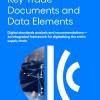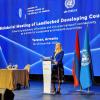Press Releases
Displaying Results 1 - 25 of 33
To share, exchange and understand data, ships and ports need to use harmonized international standards. When ships enter and leave ports, vital information must be exchanged with various entities on land about the ship, cargoes, dangerous goods, crew, passengers and other relevant information for
Trade documents are the building blocks of global supply chains, articulating key terms of transactions or events occurring between two or more parties.
The publication today of the Key Trade Documents and Data Elements (KTDDE) report by the Digital Standards Initiative (DSI) of the
Due to their geographical location, the world’s 32 Landlocked Developing Countries (LLDCs) are facing common problems that negatively affect their economic engagement with the rest of the world. Long distances from the nearest seaports, inadequate transport and transit systems multiple border
Persisting effects of the COVID-19 pandemic, geopolitical turbulence and high inflation continue to challenge international trade. Despite these global disruptions, countries are continuing to move towards a seamless and efficient trading environment by simplifying and digitalizing formalities in
Through recommendations of its subsidiary body, the United Nations Centre for Trade Facilitation and Electronic Business (UN/CEFACT), UNECE has contributed to the elaboration of the new regulation that establishes the European Union Single Window Environment for Customs.
The new regulation
In business environment, effective data exchange is instrumental to reducing the cost and time of trade transactions, especially in the context of growing digitalization of global trade. If semantically aligned and harmonized with international standards, efficient data exchange can enable trade
In today’s globalized economy, goods move through complex supply chains and cross borders – often numerous times, which involves multifaceted interactions among a variety of suppliers and trade actors. The COVID-19 pandemic and the war in Ukraine have brought to light the challenges of supply chain
Countries across the globe are continuing to move towards a seamless and efficient trading environment, within and beyond national borders, by simplifying and digitalizing formalities in international trading, helping to sustain international trade despite the disruption caused by the COVID-19
Trade facilitation reforms are a continuous process. Thus, a periodic review of the progress made in this endeavour is beneficial for the stakeholders in trade facilitation. Whether it is a general measure like submitting a customs declaration or an advanced measure like cross-border exchange of
Harmonizing and standardizing not only trade procedures, but also the accompanying information flows, can unlock significant time and cost savings. For this, using the same terminology and the same semantics of terms in different languages is crucial.To support this aim, UNECE has today released
Streamlining border crossing and helping traders to access international markets can provide significant stimulus to national economies. A Single Window for international trade is the ideal solution to achieving this; however, fostering the cooperation between government agencies and replacing
The third United Nations Global Survey on Digital and Sustainable Trade Facilitation 2019 has been launched by UNECE and its four counterpart United Nations Regional Commissions (UNRCs) across the globe. The Survey helps to track countries’ progress on a range of measures to make trade more
International standards and harmonized processes can boost trade by enabling countries and companies to cut costs and reduce bureaucracy. The digitalization of these standards brings additional efficiency gains, further multiplying the benefits of their use. UNECE has taken another step towards
With the official opening of a modern in vitro laboratory for seed potato cultivation, quality control and virus elimination, at Shushari, near Sankt Petersburg, on 26 January, UNECE finalized a multiyear project financed by the Russian Federation that significantly raised the quality of seed
UNECE member States are progressing on almost all fronts of trade facilitation and paperless trade, a new report shows. The report, based on the Second Global Survey on Trade Facilitation and Paperless Trade 2017, was released on 9 December at a side event co-organized by the UN Regional
For over a decade, the UNECE Recommendation 33 on Single Window has been the cornerstone definition for this trade facilitation tool enabling streamlined border-crossing procedures and allowing traders to submit all export-import related information to a single entry point. This definition is
Reducing trade costs is essential for countries to effectively harness trade as an engine for growth and sustainable development. This can be accomplished by tackling non-tariff sources of trade costs and addressing cumbersome regulatory procedures and documentation requirements. Indeed, trade
Countries around the world are moving towards seamless global supply chains. This is one of the key preliminary findings of the Joint United Nations Regional Commission (UNRCs) Survey on Trade Facilitation and Paperless Trade, presented on Wednesday 12 July, at the World Trade Organization (WTO
The OECD estimates that countries could reduce trade cost by about 5% only by simplifying trade documents, automating trade, and customs processes. The revision of two Recommendations and the adoption of a new one by the UN Centre for Trade Facilitation and Electronic Business (UN/CEFACT) last
National Trade Facilitation Bodies are national-level platforms which can act as the main coordinating body for Trade Facilitation reforms and can facilitate effective consultation among the public and private sector stakeholders. In recent years, a multiplicity of bodies promoting Trade
International recommendations, standards and tools have a crucial role to play in the effective implementation of the World Trade Organization’s (WTO) Trade Facilitation Agreement (TFA). This was the key message agreed by international experts at an event organized by UNECE jointly with the
Harmonizing processes and data for use across the different modes of transport in international trade would help goods move faster and cheaper. Global experts from the trade and transport sectors converged in Marseille this week to streamline related supply chain processes under the United
Afghanistan, Kazakhstan and Tajikistan are landlocked countries a long distance from the closest seaports, which creates special challenges for their participation in international trade. As a result, trade facilitation and the elimination of unnecessary procedural and regulatory barriers to
Private Sector representatives at the Global Facilitation Partnership meeting in Geneva last week stressed their willingness to support international organizations in assisting countries implement the recently concluded World Trade Organizations Trade Facilitation Agreement. Speaking on
On 12 December, the Ukrainian Interagency Working Group on trade facilitation met and decided to: carry out a survey on the readiness of Ukraine to implement the WTO Trade Facilitation Agreement; consolidate the national trade facilitation body of Ukraine; and develop a national trade facilitation











